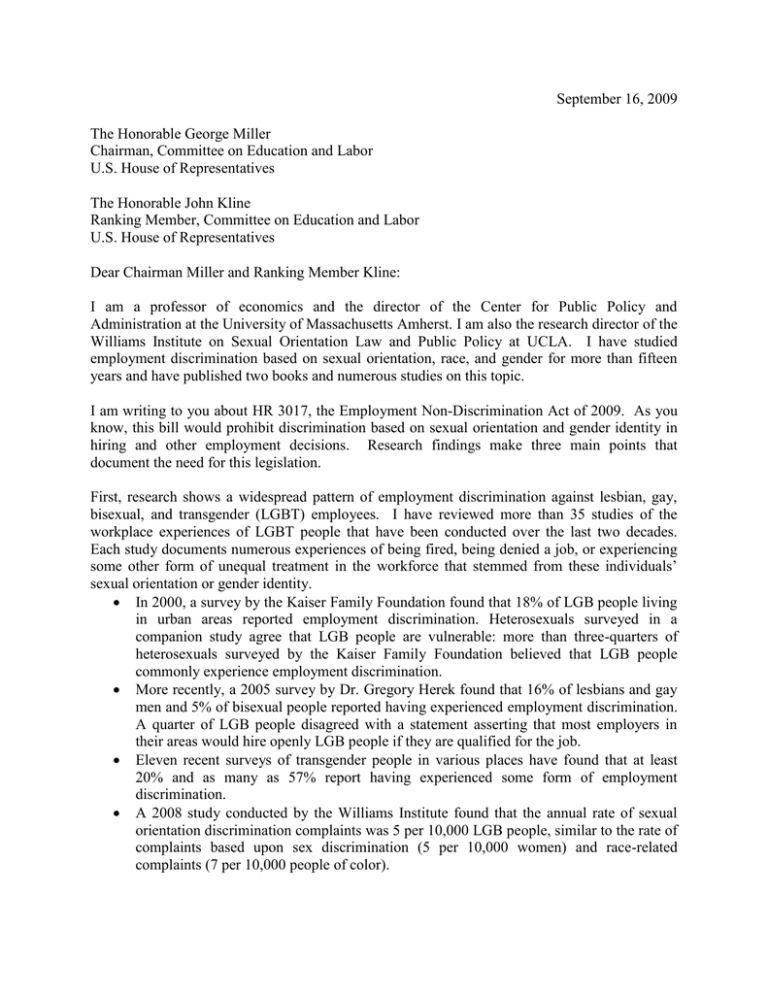
September 16, 2009
The Honorable George Miller
Chairman, Committee on Education and Labor
U.S. House of Representatives
The Honorable John Kline
Ranking Member, Committee on Education and Labor
U.S. House of Representatives
Dear Chairman Miller and Ranking Member Kline:
I am a professor of economics and the director of the Center for Public Policy and
Administration at the University of Massachusetts Amherst. I am also the research director of the
Williams Institute on Sexual Orientation Law and Public Policy at UCLA. I have studied
employment discrimination based on sexual orientation, race, and gender for more than fifteen
years and have published two books and numerous studies on this topic.
I am writing to you about HR 3017, the Employment Non-Discrimination Act of 2009. As you
know, this bill would prohibit discrimination based on sexual orientation and gender identity in
hiring and other employment decisions. Research findings make three main points that
document the need for this legislation.
First, research shows a widespread pattern of employment discrimination against lesbian, gay,
bisexual, and transgender (LGBT) employees. I have reviewed more than 35 studies of the
workplace experiences of LGBT people that have been conducted over the last two decades.
Each study documents numerous experiences of being fired, being denied a job, or experiencing
some other form of unequal treatment in the workforce that stemmed from these individuals’
sexual orientation or gender identity.
In 2000, a survey by the Kaiser Family Foundation found that 18% of LGB people living
in urban areas reported employment discrimination. Heterosexuals surveyed in a
companion study agree that LGB people are vulnerable: more than three-quarters of
heterosexuals surveyed by the Kaiser Family Foundation believed that LGB people
commonly experience employment discrimination.
More recently, a 2005 survey by Dr. Gregory Herek found that 16% of lesbians and gay
men and 5% of bisexual people reported having experienced employment discrimination.
A quarter of LGB people disagreed with a statement asserting that most employers in
their areas would hire openly LGB people if they are qualified for the job.
Eleven recent surveys of transgender people in various places have found that at least
20% and as many as 57% report having experienced some form of employment
discrimination.
A 2008 study conducted by the Williams Institute found that the annual rate of sexual
orientation discrimination complaints was 5 per 10,000 LGB people, similar to the rate of
complaints based upon sex discrimination (5 per 10,000 women) and race-related
complaints (7 per 10,000 people of color).
Twelve studies show a significant pay gap for gay men when compared to heterosexual
men who have the same productive characteristics. Depending on the study, gay and
bisexual men earn from 10% to 32% less than similarly qualified heterosexual men.
Lesbians generally earn the same as or more than heterosexual women, but lesbians earn
less than either heterosexual or gay men.
Second, the surveys that find evidence of discrimination include employees from many different
kinds of workplaces, including state governments, local governments, the federal government,
and private employers. Therefore, those studies provide evidence that sexual orientation and
gender identity discrimination occurs in all sectors of employment, the private sector as well as
state, local, and federal employment.
Finally, research suggests that reported cases and administrative complaints underreport the
amount of discrimination experienced by LGBT people. Many studies document the fact that
LGBT employees often do not reveal their sexual orientation or gender identity in their
workplaces for fear of discrimination. They also may be reluctant to “out” themselves further by
filing complaints and facing administrative agencies and courts that have been hostile to their
claims. Both of these factors suggest that discrimination against LGBT workers could be even
greater than the degree suggested by the studies discussed earlier.
To summarize, more than a decade of research finds ample evidence of discrimination against
LGBT workers. These patterns of discrimination demonstrate the need for and importance of the
Employment Non-Discrimination Act of 2009.
Yours truly,
M. V. Lee Badgett




